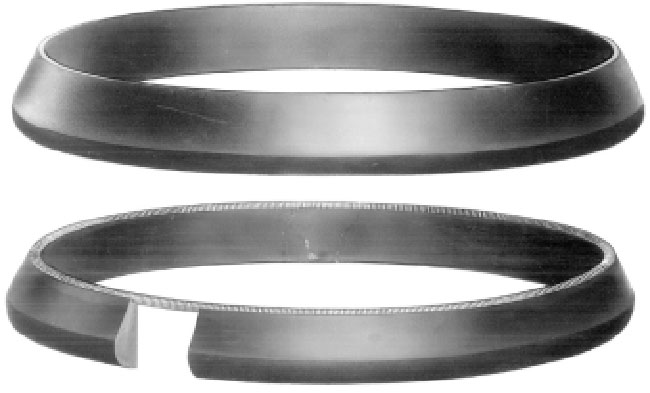COUPLING & REPAIR
Dresser Compounded Rubber Gaskets
Pipe joints must be able to absorb pipe stress caused by natural forces and natural expansion, contraction, vibration and deflection while the line is in service. The sealing capabilities and the extreme flexibility of a Dresser coupled joint is made possible by the resilience of the rubber-compounded gaskets.
Resiliency is the property that enables the gaskets to maintain pressure against the followers that confine it and, at the same time, allow for flexibility not found in rigid piping connections. Without it, a flexible joint is not possible. Simply put, the absorption of pipeline stress permits each section of the pipeline to “float” in the joint, ensuring a flexible piping system while reducing the chance of leakage, line breaks, costly repairs and service interruptions.

Armored® Gaskets
Armored gaskets can be used to great advantage where low electrical-resistant joints are desired. The armor “bites” into the pipe providing metal to metal contact allowing easy passage of current where cathodic protection is a necessity.
The armor—an elastic, practically indestructible brass coil or helix—is molded into the gasket tip becoming an integral part of the gasket. When used with the proper grade/compound rubber, the armor shields the gasket material from the line content without interfering with the sealing efficiency of the gasket.
BUNA-S Grade 27 (Styrene) Max. Temp. 212°F
The compound most generally used for plain gaskets is BUNA-S. This gasket has wide applications and is accepted as standard for most pipeline use. It is recommended for use on lines transporting both fresh water and salt water, natural and other gases, air, most acids, alkaline and sugar solutions and some refrigerants.
BUNA-N Grade 42 (Nitrile) Max. Temp. 212°F
BUNA-N gaskets are resistant to oil, most aromatic and aliphatic hydrocarbons, natural gas fogging oil, condensates and gasoline.
Butyl – Max. Temp. 250°F; PSI to middle ring yield strength
Butyl gaskets are resistant to hot air service, steam, hot water and miscellaneous aqueous solutions. They are also suitable for vegetable oils, organic chemicals, oxidizing acids and alkalies.
EPDM – Max. Temp. 300°F; MAX PSI: 250
EPDM gaskets provide excellent resistant to aging factors such as ozone, oxygen and elevated temperatures. This includes service in hot water, steam and dry heat. They are also suitable for handling popular chemicals such as ketones, alcohols, phosphate ester hydraulic fluids, glycols, vegetable oils, inorganic salt solutions, diluted acids and alkalies.
VITON (Fluorocarbon) Max. Temp. 350°F; MAX PSI: 100
Fluorocarbon gaskets are resistant to hydrocarbons, aromatic hydrocarbons, alcohols, organic acids, nitrogen-containing compounds, vegetable oils and greases.
High Temperature – Max. Temp. 1200°F; NO PSI RATING
These braided, flexible gaskets are designed specifically for high temperature and abrasive atmospheres associated with services such as fly ash handling systems. As a replacement for asbestos, these gaskets are manufactured of a pure homogenous graphite bonded to a fiberglass carrier for strength and thermal durability. The braid over braid construction is die-formed and cut to length to fit proper coupling configurations resulting in a uniform tolerance which has proven itself as a reliable asbestos replacement.
Note: The non-resilient characteristic of this particular gasket material may result in a non leak-proof seal. This should be taken into consideration for this application.
